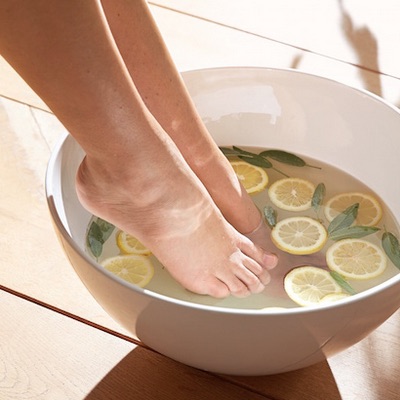What Each Different Odor On Your Body Say About Your Health
Last updated on
Body odor is a normal part of life. When we perspire from working out or from surrounding heat, we produce an odor. When our bodies digest fiber and whole foods, we create waste and often times excess gas.
Some odors come from our guts, others from our mouths, and others still from our feet. Whether the smell is internal or external makes no difference, but when the odor is really bad you just shouldn’t ignore it. Try as you may, you just can’t ignore the signs of poor health.
So what are these signs? Here are 5 common body odors and the signs that tell you that they are becoming problematic.
What Body Odor Says About Health
1. Smelly Sweat
Sweat releases toxins from your body, so it makes sense that it has an odor. When sweat is smelly though, it may be a sign of a bigger problem. Problems digesting dietary fats (causing a rancid smell) or a magnesium deficiency (causing a “locker-room smell”) are the most common.
A bacterial skin infection will cause a yeasty or stale damp smell. Kidney failure or liver failure may cause sweat to smell like ammonia. The first step to figuring out the problem is knowledge—try to figure out which issue is causing your extreme smell, then fix it.
Boosting your high-fiber foods and veggies is a good start. Fiber soaks up toxins and eliminates poorly digested foods. You’ve got to reduce your sugar-intake as well; sugar depletes magnesium and feeds odor-causing yeast in your body. Dark leafy greens and green juicing help with a magnesium deficiency, so reach for broccoli and kale.
Stress and alcohol also deplete magnesium and increase sweat production, so try to limit both.
2. Body Odor
Occasional or mild body odor is normal, but when it becomes excessive or offensive, it’s time to pay attention to what could be wrong internally.

Some of the causes of offensive body odor include poor personal hygiene, nutrient deficiencies, gastrointestinal problems, liver disease, underlying medical conditions and long-term medication.
When undergoing emotional stress, your body may produce a different kind of sweat that is most offensive. It is a “milky fluid” that is secreted through your apocrine glands. Bacteria love to feed on this type of sweat that is fat and protein based, as opposed to water and electrolytes in your regular after-workout sweat.
Daily including a glass of green juice in your diet does help to reduce body odors of various kinds as the nutrients from green juice are excellent for blood alkalizing, help with digestion, improve your gastrointestinal flora, and remove bad bacteria.
Other steps you can take: Practice good eating habits.
3. Bad Breath
With occasional bad breath, dehydration and dry mouth are culprits, as are coffee and garlic, which are known to cause bad breath.
One of the most common reason for bad breath is usually a sluggish digestive system and constipation. There is bacterial overgrowth in the upper intestines that causes the offensive odor. A good gastrointestinal cleanse with psyllium husk or a fibrous diet is necessary in this case.
Some people lack zinc or B-vitamins (thiamine) which depletes stomach acid and ends in bad breath. Eat more lean meats and seeds for zinc, and oatmeal, oranges and green peas for thiamine. Also, nervousness or anxiousness triggers the release of stress hormones which can have a negative effect on breath.
Acid-suppressing drugs (esomeprazole, omeprazole) often give putrid smelling breath. When stomach acid is lacking, food ferments in the gut and results in bad-smelling breath.
If bad breath has a “fruity smell” it means fats and proteins are being burned instead of glucose, and could be a sign of diabetes. Breath with a fishy smell may be liver failure. An ammonia smell may indicate late stages of kidney failure.
Brush and floss twice daily to avoid bad breath. If your gums are red, bleeding, or tender you may have gum disease and should consult your dentist. If you have constantly bad breath, consult your doctor, as it may be a sign of a much bigger problem.
Other steps you can take: Drink lots of water, green juices, and ensure you’re properly hydrated with the right kind of beverages. Green or Matcha tea have phytonutrients and polyphenols that help fight the odor. Also check out other types of teas you can include in your list of favorite beverages.
4. Foul Flatulence
A poor absorption of dietary fats is often caused by a lack of pancreatic enzymes or bile to help with digestion. Insufficient stomach acid may also put a toll on the digestive tract, making food take longer to fully digest.
Dysbiosis, an imbalance of bacteria in the intestines, is caused by consuming antibiotics, contaminated foods, or poorly cooked meats, and can cause bacterial infections where the bad bacteria outweighs the good.
If you have constantly excessive flatulence and bad-smelling gas, ask your doctor about an over-the-counter pancreatic enzyme supplement that contains amylase, protease, or lipase. These enzymes help break down food in your gut.
Amylase is a product of your saliva, so chew food thoroughly when eating to produce as much amylase and breakdown the food as much as possible.
Since flatulence is also mostly a sign of a poor intestinal flora health, taking a high quality and count probiotics daily will help. How long to take it for? Until there is no more flatulence! With good intestinal flora health, you will never encounter issues of foul flatulence.
Other steps you can take: Practice good eating habits.
5. Yucky Urine
One of the most common reason for smelly urine is when you’re not drinking enough water and your body is dehydrated. When your kidneys/bladder have less amount of water, urine is concentrated with waste products, causing it to give out a strong odor of ammonia. This can be easily corrected by simply drinking more water. Read how much water you need to drink daily.
As long as you haven’t been ingesting asparagus—known to change urine’s smell temporarily—your putrid pee may be a sign of UTI or worse. A sickly sweet smelling urine could mean you’re peeing ketones, a chemical substance found in the body to help breakdown fat reserves for energy. This could be a sign of diabetes, so you may want to get your urine tested.
For UTI-treatment, increase your cranberry intake. Make cranberries part of your daily diet—they help form a seal that protects your bladder walls from the UTI-forming bacteria.
6. Funky Foot Fragrance

Your feet may be infected if the skin is broken, scaly, red or inflamed. If the wounds do not heal it is possibly a symptom of diabetes and you should certainly see a doctor.
Try soaking your smelling feet in a quart of warm water with at least a tablespoon of vinegar, for at least 30 minutes a day or try this foot bath. You could also try a menthol vapor rub that contains essential oils with antiseptic properties.
Some of the links I post on this site are affiliate links. If you go through them to make a purchase, I will earn a small commission (at no additional cost to you). However, note that I’m recommending these products because of their quality and that I have good experience using them, not because of the commission to be made.











 JOIN OVER
JOIN OVER
Comments